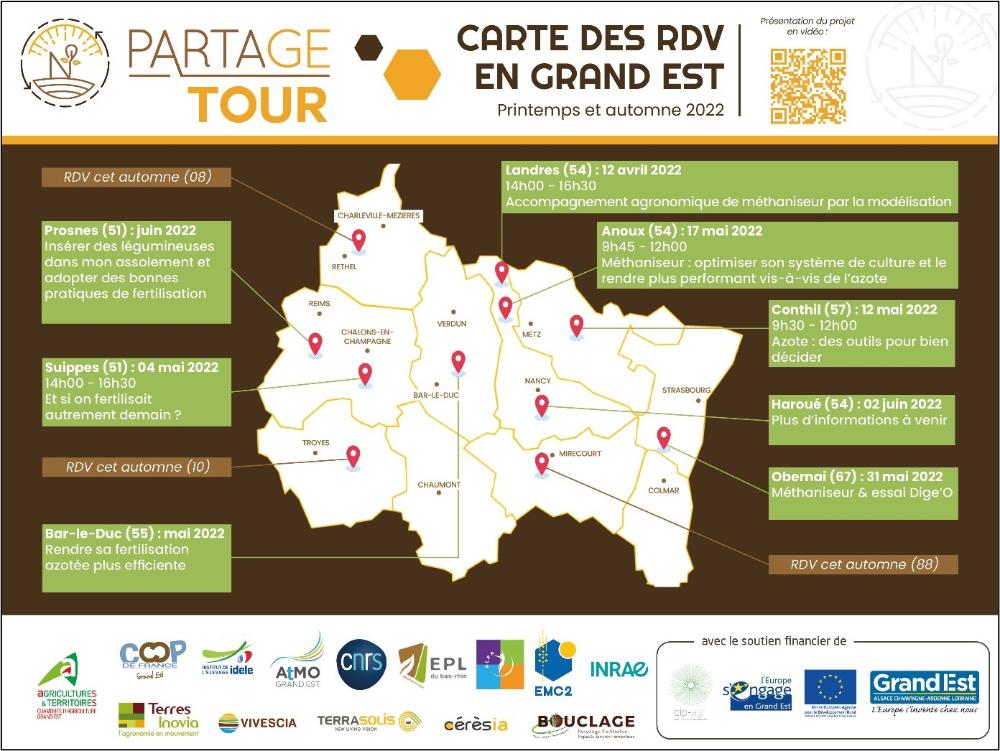PEI-PARTAGE: on-farm technical days organized
PEI-PARTAGE: on-farm technical days organized
A series of technical days on farms is organized by PEI-Partage. This regional agronomic project, in which Terres Inovia is a partner, is dedicated to the agro-ecological transition in the Grand-Est region. The objective is to share the project's achievements with the region's farmers in the spring and fall of 2022.
The PEI-Partage project is at the heart of agro-ecology: how to be more autonomous in nitrogen? Reduce losses by leaching and volatilization? How to insert leguminous plants in your system? Or how to make the most of organic matter? The project aims to share and complete the knowledge acquired to better complete the nitrogen cycle in a win-win approach between agriculture and the environment, the producer and the citizen. This is why technical days are organized in spring and fall 2022: the PARTAGE Tour.

The programs for the next two days of the PARTAGE Tour are based on a specific theme: "Agronomic support for methanizers" on April 12, "What if we fertilized differently tomorrow? on May 4. For the next two days, the programs will be communicated as they become available.
A collaborative regional project since 2020
The challenge of this regional project? To identify and activate the relevant levers to reduce nitrogen losses outside of cropping systems? This is one of the main sources of agricultural pollution for air and water and a source of GHG emissions from the field crop sector.
This project was initiated in January 2020 with 22 agricultural partners from the Grand Est. Three axes have been defined:
- Find innovative solutions on the farm
- Produce nitrogen in the field through legumes
- Manage organic matter on a territorial scale.
How to mobilize nitrogen from legumes?
Within this PARTAGE project, the second axis, coordinated by Terres Inovia, combines the desire to strengthen France's protein sovereignty (according to the national strategy on plant proteins) with the reduction of the environmental impacts of agricultural systems in full transition.
Thus, producing nitrogen in the field by mobilizing nitrogen from the natural capacity of legumes to fix nitrogen in the air is a strategy that benefits both crop production, which is more self-sufficient in nitrogen, and the planet and society as a whole, by reducing acidifying emissions and greenhouse gas (GHG) emissions linked to synthetic fertilizers.
An interesting study of the multi-performance of cropping systems
In addition, France aims to strengthen its sovereignty in plant protein sources.
In 2021, the study of the multi-performance of cropping systems without and with pea or faba bean in six cases representative of the region has shown the agro-environmental interest of these crops (lower IFT, GHG, energy, etc.).
The interest is also economic in several situations, depending on the type of contract and the degree of optimization of the cropping system to reduce nitrogen inputs and optimize the yield of the following crops. An additional incentive for a transition to systems with pea, faba bean, lentil or soybean is a contribution to climate change mitigation: calculations in all the cases studied showed an assured reduction in the carbon footprint of the systems considered.
The best management of soil cover allows to avoid nitrogen losses by leaching and to optimize the return of biomass to the soil, and thus to favor carbon storage in the soil.
In order to find the right control of pea, faba bean and lentil crops in a context of increased climatic hazards, agronomic diagnoses in farmers' plots are carried out over the 2 agricultural seasons by Terres Inovia with advisors and farmers.
Contacts :
Anne Schneider- a.schneider@terresinovia.fr
Bastien Remurier- b.remurier@terresinovia.fr
Learn more about the PARTAGE project:
Video presentation of the project:
To register for the PARTAGE Tour
maeva.weens@grandest.chambagri.fr